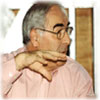Zukunftszeugen VII - Ricardo Petrella
Index Interview
Transcript 1
Transcript 2
Transcript 3
Transcript 4
|
Zukunftszeugen VII - Ricardo Petrella Index Interview Transcript 1 Transcript 2 Transcript 3 Transcript 4 |
|||||
| |

3. The City of the 21st Century I mean that if we enable, allow citizens to become participants in the cities' affairs, we would move towards a new kind of city that people want to have. It is not true that people don't want to participate in the city affairs. They want, but they are not really allowed to do that. There are not many instruments which enable people to take part, to make decisions. But I think that today, there is a strong movements towards: let's redefine the city. What is the city? What is a community? How can people participate? What is the role of the associations, what of local communal concepts? For example, even in Germany, there are now groups of the so called rivers' contracts, where people living at the river, residents or industrial people or tourist, they come together and make a river contract and say: The river belongs to all of us. So you have not the right to use it without taking into account the interest of the others. And this is a kind of participatory type of a democracy on a local good. And a city is a local good. TOP |
||||
Project Background | Events | Reports and Essays Zukunftszeugen | Contact Us | Home Page Last Modified: 2002-04-23 TOP |
|||||